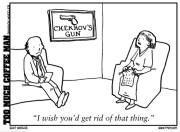|
Home
|
Jul 15, 2024
This week’s themeWhose what? This week’s words Chekhov's gun Parkinson's law Barney's bull John Thomson's man collier's faith 
“I wish you’d get rid of that thing.”
Cartoon: Shannon Wheelie Previous week’s theme Misleading words A.Word.A.Day
with Anu GargA friend of mine once brought me a box of thin baked savory biscuits. a brand called Mary’s Gone Crackers. It reminded me of the brand name Kellogg’s Corn Flakes. It was obvious the crackers were made by someone named Mary, but what kind of crackers are gone crackers? I wondered. Maybe gone was some obscure slang for delicious? Then I realized that the word gone in Mary’s Gone Crackers is not an adjective, but a verb. In other words, Mary has gone crackers, similar in meaning to, should she ever diversify her product line, Mary’s Gone Nuts. The apostrophe-s in the construction Mary’s is ambiguous. It could mean one of three possibilities, the correct one of which must be inferred: Mary has Mary is Of Mary (possessive) Context often helps, but not always. Hence, products with funny-punny names. While you can possess those crackers for a few bucks (or have a dear friend bring them to you -- thanks, Persim!) there’s no possessive there. But all of this week’s terms have the apostrophe-s construction and you can be sure it’s a possessive eponym. Also, while we know who Mary is (Mary Waldner, a psychotherapist turned baker), and we also know who the people are in some of the terms featured this week, the possessors in other terms shall remain obscure. Chekhov’s gun
PRONUNCIATION:
MEANING:
noun: 1. The literary principle that if an element is introduced in a story, it must be shown to have a purpose. 2. An element introduced in a story that is revealed to have a purpose later on. ETYMOLOGY:
After the playwright and doctor Anton Chekhov (1860-1904) who espoused
this principle. Earliest documented use: 1951.
NOTES:
Chekhov said, “One must never place a loaded rifle on the stage
if it isn’t going to go off.” Not trying to be a smart alec, but one must
never place a loaded firearm on a stage or set, going off or not. At
any rate, we understand his point and it wasn’t about the rifle gathering
rust. Also see: red herring, McGuffin, prolepsis, Ockham’s razor. USAGE:
“The producers rub it in a bit. ‘The Northwest Territories is home to
over 3,000 bears,’ says the narrator, who speaks in a low, ominous growl
and who I quickly suspect to be a bear. In dramatic terms, bears are
Chekhov’s gun, and if at least one person isn’t eaten by a bear by the
end of this show it will betray a loose grasp of dramatic structure on
the part of the ursine narrator.” Patrick Freyne; One Survivalist Wants to “See What I’m Made Of”; Irish Times (Dublin); Aug 11, 2023. A THOUGHT FOR TODAY:
The bicycle is the most civilized conveyance known to man. Other forms of
transport grow daily more nightmarish. Only the bicycle remains pure in
heart. -Iris Murdoch, writer (15 Jul 1919-1999)
|
|
Subscriber Services
Awards | Stats | Links | Privacy Policy
Contribute | Advertise
Awards | Stats | Links | Privacy Policy
Contribute | Advertise
© 1994-2025 Wordsmith